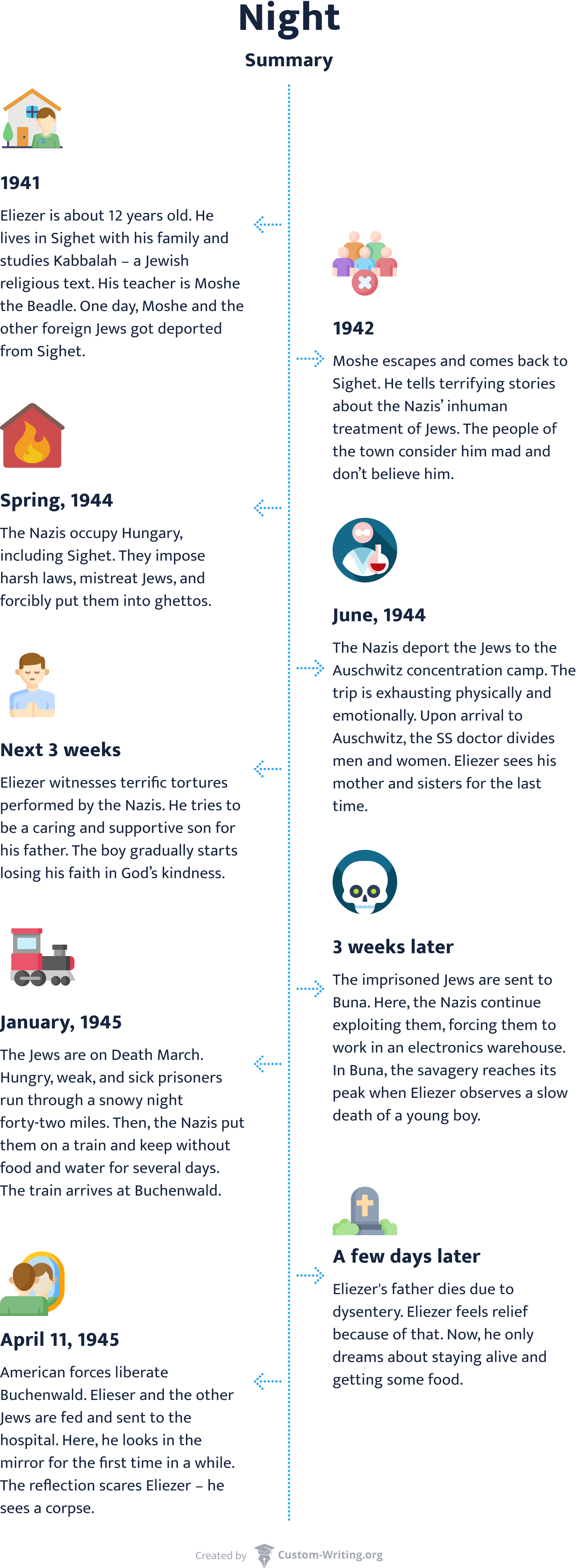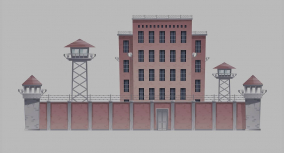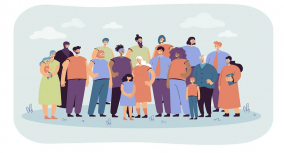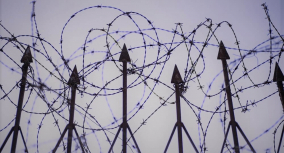Night is a semi-fictional memoir by the Romanian-born American writer Elie Wiesel. The book tells the horrifying story of a Jewish teenager who goes through the dreadful torture of the Holocaust.
Below, you will find a summary of Night, analysis of the novel’s themes, and a plot infographic.
Short Summary of Night by Elie Wiesel
The narrative of Night centers on Eliezer, a devout young Orthodox Jew who was deported to Auschwitz concentration camp in the early 1940s. Eliezer battles to hold onto his religion in Auschwitz while giving witness to the other inmates’ loss of humanity and faith. Elie Wiesel’s personal account of surviving the Holocaust serves as the inspiration for the Night.
Night (Elie Wiesel) Summary Infographic
The action takes place during World War II. Thus, the book’s analysis needs to go back in time to that historical period.

Night by Elie Wiesel Summary
The action started in 1941. Eliezer is a 12 years old Jewish boy living in the town of Sighet. He is deeply religious; he spends much of his time praying and reading the Torah and the Talmud.
Eliezer’s family follows ancient Jewish traditions and adheres to the law. His father is a highly respected person in the Jewish community of Sighet. The family runs their own business—a shop. Eliezer has two older sisters—Hilda and Bea, and a younger one—Tzipora.
Besides the Torah and the Talmud, Eliezer starts studying the Cabbala (Kabbalah) – the Jewish mystical text. The boy finds a sensitive teacher – a Jewish immigrant named Moché the Beadle. Soon, the Hungarian police deport all the foreign Jews, including Eliezer’s teacher. After several months, he manages to escape and return to Sighet. He talks about the Gestapo that made the Jews dig graves for themselves and then were mercilessly killed. The people in the town refuse to believe in Beadle’s tales and perceive him as mad.
The next episode of the Night’s summary takes place in the spring of 1944. Fascists take the Hungarian government, and the German army occupies Sighet. Then, a sequence of horrible events happens to the Jews of the town. The leaders are arrested; all the property is confiscated. All the Jews are put into the convoys and sent to an unknown destination. Eliezer’s family is one of the last ones to leave Sighet.
For several days, the Jews are in the sweltering cattle cars with little food and water. Some of the deporters start behaving inadequately due to the inhuman conditions. For example, a middle-aged madam Madame Schächter becomes hysterical because of the vision of flames.
Then, the summary of the book Night by Elie Wiesel takes place at Auschwitz-Birkenau concentration camp. The prisoners on the train start noticing the chimneys of furnaces through the windows. As they go outside, they feel the terrible odor – the smell of burning flesh.
The guards separate the women and children from the men. This is the last time when Eliezer sees his mother and sisters. Then, the SS doctor, Mengele, determines whether the men can work. Eliezer and his father lie about their age to increase the chances of staying alive. As a result, they pass the selection and are settled in the barrack for three weeks. There, the Jews are under the Kapo’s oppressive supervision. He is a sadistic head prisoner in charge of the other convicts.
Being in Auschwitz, Eliezer witnesses horrifying deaths of people. He starts rebelling against God and shows his skeptical attitude towards people who continue praying.
The next episode worth being described in the Night (Elie Wiesel) summary is the prisoners’ life in Buna. It is a factory in Auschwitz, where the Jews are forced to sort electrical parts in the warehouse. Here, Eliezer has another Kapo – Idek. He is ruthless and savage. The rising action reaches its peak when Eliezer witnesses how the guards hang the 13 years old boy. Here is when the main character completely loses his faith in God.
Meanwhile, the time for the second selection comes. This time, the doctor considers Eliezer’s father to be weak and incapable of working. However, having a strong desire to live, the father manages to prove his capability and stays alive. In contrast, Akiba Drumer, another prisoner who lost his faith, is incapable of fighting for life. He is not granted a second chance.
As winter comes, things go worse. The convicts start suffering from extreme coldness. While undergoing an operation, Eliezer’s foot swells up because of frostbite.
Did Elie Wiesel lose his foot? Fortunately, no. He had surgery and the wound healed. As the book Night is autobiographical, the author reflects his life story on the main character. So, Eliezer has surgery and then recovers.
Meantime, the rumors that the Russian army is approaching start spreading around the concentration camp. Thus, the Germans decided to evacuate it immediately. SS troops force the prisoners to go into a death march to another concentration camp – Gleiwitz. The exhausted people are on a horrible journey for hours during the night in the snow. Lacking power, they lie down, and the Nazi soldiers shoot them. Only the most resilient continue their way and fight for life.
Malnourished and weakened, Eliezer does not give up because he is concerned about his father. They overcome this nightmare together. Finally, the survivors reach Gleiwitz. Suffering from depletion, thirst, and hunger, the prisoners sit in total quietness. Suddenly, the sound of the violin breaks the silence. One of the prisoners, the Jewish musician Juliek, starts playing a pleasant melody, and Eliezer falls asleep. During the night, Juliek dies.
The Nazis keep the victims of the Holocaust without food and water for several days. Then, there is another selection. Eliezer’s too exhausted and unconscious father is accidentally perceived as dead. However, the son manages to save him.
The Jews are herded into the cattle cars, and the endless train ride begins. For ten days, people are eating nothing but snow. Sometimes, the German workers give the prisoners scraps of bread. The starving people fight to the death to get some food. During the trip, more people passed away. Only 12 people out of 100 arrive at another concentration camp – Buchenwald.
The long road to Buchenwald had a detrimental effect on the health of Eliezer’s father. He feels how death is approaching him. Eliezer tries his best to save his dad. Fighting for the father’s life, the boy even shares his food. At the same time, he feels terrible. Instead of gaining energy for survival, he wastes his food on his almost dead father.
On January 29, 1945, Eliezer’s father is taken to the crematory. However, the main character does not mourn or cry. Instead, he feels relief. For the next several months, Eliezer spends his time in Buchenwald with the only hope of getting food.
In April 1945, the American army comes to the camp. Before escaping, the Nazis decide to murder the rest of the prisoners. Nevertheless, the Americans prevent SS from doing this. Finally, the USA army drives the Germans from the concentration camp and releases the Jews. Now, free prisoners no longer think of liberty, dignity, or their families. Their only desire is to feed themselves.
Hardly alive, Eliezer is fatally ill. He spends several weeks in the hospital confined to his bed and dealing with food poisoning. When he finally finds the strength to rise, he comes to the mirror. The boy did not look at himself since he left Sighet. The frightening reflection forced him to terrify. Eliezer saw the face of a corpse in the mirror.
How old was Elie Wiesel at the end of Night? Since the story is autobiographical, Eliezer and Elie Wiesel epitomize the same person. At the beginning of the book, in 1941, the main character was 12 years old. When Eliezer sees the face of a corpse in the reflection, he is only 15 years old.
Night by Elie Wiesel Analysis
The entire book is built on the idea of anti-semitism, a social anti-Jewish campaign. It started its rapid development in the 1930s when Adolf Hitler came to governance. The movement reached its peak during World War II. The Nazis even created the plan of the Jewish population extermination called The Final Solution.
According to the plan, Jews from all over Europe were supposed to arrive in the concentration camps. Here, they had two options: to be killed or work under the oppressive and inhuman conditions. The prisoners were kept alive as long as they were capable of working. Then, they were killed.
The order in the different camps was the same. The deported Jews were living in barracks with the kapos. In case you are wondering what kapos are, here are a few terms you have to keep in mind:
- Kapos are the head prisoners appointed by the blockalteste to oversee the fellow inmates.
- Blockaltestes are barrack commanders who are chosen by the lageralteste.
- The lageralteste is the ruler of the entire camp.
The kapos usually had certain benefits. However, they took responsibility for keeping the other prisoners productive.
The working and living conditions in the camps were unacceptable. The Nazis treated Jews like animals, not giving them enough food, water, and rest time. As a result of The Final Solution plan implementation, nearly 6 million Jews were killed during the Holocaust.
The main character of Night, Eliezer, goes through the sufferings and pain of the Holocaust with his father, Shlomo. Wiesel describes Eliezer as a profoundly religious kid who reads the Torah, the Talmud, and the Kabbalah. He believes in faith and prays to God.
Through the development of the storyline, Eliezer’s worldview transforms to a great extent. The setting plays a crucial role in the character’s personality change.
Settings in Night by Elie Wiesel
The action starts in the town of Sighet, where Eliezer is a cheerful teenager. He adheres the Jewish traditions and follows God. Here, however, certain preconditions of the upcoming sufferings occur. For example, as the Jews in Sighet are issued the decree to wear the yellow star, Eliezer’s father reacts with skepticism. The situational irony here is that it became the Holocaust symbol that reflects death and tortures.
The boy then appears in Auschwitz, where the cruel Dr. Mengele determines the people’s fates: to live or to die. In this concentration camp, Eliezer witnesses the inhumane treatment of humans and horrible deaths. Here, the boy starts being skeptical of God and spiritual power.
The next camp Eliezer arrives at is Buna. Facing cruelty, viciousness, and injustice, he starts openly rebelling against God. The savagery picks when the guard hangs a 13 years old boy in front of him. As a result, Eliezer completely loses his faith. Now, he only believes in family ties and desires to stay close to his father.
Then, the prisoners are sent to Buchenwald. Here, Eliezer loses hope for the bright future and freedom. Even his warm feelings toward his father diminish. Although the son supports his father until the end, Eliezer experiences relief as the dad passes away.
What message does the narrator communicate by describing the death of his father? He highlights his total transformation. From a caring son, he turns into an indifferent human, incapable of feeling anything but a strong desire to feed himself. Moreover, the narrator points out the concentration camps’ surviving principle: to look out only for yourself and not help anyone else.
The climax of Night is when the Americans free Buchenwald. However, being physically free, Eliezer is not rescued spiritually and emotionally. Going through the trials, he lost everything valuable to him. Even being one of the Holocaust survivors, Eliezer has too little chances to start a new, fulfilled life. Even a reflection in the mirror at the end of the story shows him the face of a corpse.
What Is the Main Idea of Night by Elie Wiesel?
The central theme of the book is the main character questioning God’s nature and existence in light of the unspeakable horrors of the Holocaust. Elie Wiesel wrote Night as a semi-autobiographical novel. He wanted to share his personal experience to show human cruelty in an effort to promote peace.
Overall, what is the message of Night by Elie Wiesel? The inhumanity is destructive. Even the most faithful and robust people break under unjust treatment, cruelty, and brutality. And finally, all human races and nationalities are equal; no religion is superior or inferior; only racists and ghouls discriminate against people.
Thanks for reading the article! For ideas to start your own analysis of Night, check our essay topics and samples.











